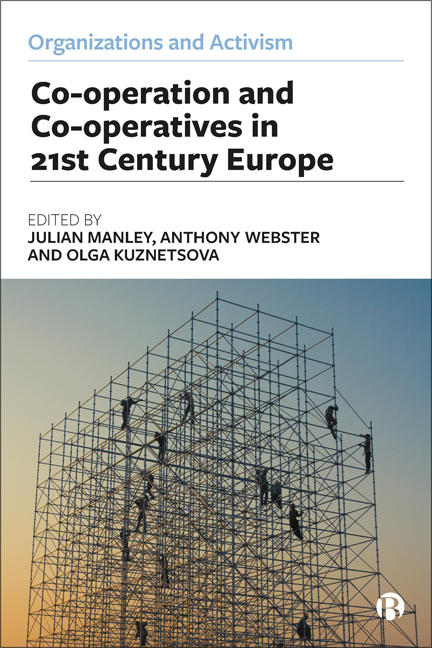Book contents
- Frontmatter
- Dedication
- Contents
- Series Editors’ Preface
- List of Figures and Tables
- List of Abbreviations
- Notes on the Contributors
- Acknowledgements
- Foreword
- 1 Introduction: European Co-operativism in a Changing World
- PART I Seeds: Identifying the Space for Co-operatives in Addressing Social Challenges
- PART II Bridges: Co-operative Culture and Education
- PART III Growth: The Preston Model, Co-operation and Community Wealth Building
- Index
6 - ‘Our Club, Our Community, Our Future’: Co-operation, Deindustrialization and Motherwell Football Club's Journey to Community Ownership
Published online by Cambridge University Press: 28 March 2024
- Frontmatter
- Dedication
- Contents
- Series Editors’ Preface
- List of Figures and Tables
- List of Abbreviations
- Notes on the Contributors
- Acknowledgements
- Foreword
- 1 Introduction: European Co-operativism in a Changing World
- PART I Seeds: Identifying the Space for Co-operatives in Addressing Social Challenges
- PART II Bridges: Co-operative Culture and Education
- PART III Growth: The Preston Model, Co-operation and Community Wealth Building
- Index
Summary
Introduction
During the 1980s the Scottish steel industry experienced ‘death by a thousand cuts’ due to the ruthless free market restructuring of the UK economy implemented by Margaret Thatcher's governments, which culminated in the closure of the vast Ravenscraig steelworks in 1992. The town of Motherwell in Lanarkshire, with a population of c.30,000, stood at the epicentre of the Scottish steel industry. The demise of bulk steelmaking not only generated mass unemployment and economic dislocation in Motherwell, it presented a challenge to the identity of the town, which was renowned as Scotland's ‘Steelopolis’ (Duncan, 1991, p 1). The local football team, Motherwell Football Club (FC), emerged from this scarring process as the last remaining symbol of local identity and pride. Yet, a decade on from Ravenscraig's closure, faced with declining attendances, falling television revenues and a spiralling wage bill following a short period of large-scale investment from a high-profile owner-investor, the club entered administration. This chapter analyses how a community-centred campaign to save Motherwell FC from extinction in 2002 evolved into a supporter takeover through the Well Society, which resulted in Motherwell FC becoming the first top division football club in Scotland and the UK to be supporter owned in 2016.
The chapter, which constitutes the first published academic account of Motherwell FC's journey to community ownership, is undergirded by a historical approach which analyses the factors underpinning supporter cooperative formation in their local socio-economic environment with a view to enabling the recent past to offer insights into contemporary social and economic trends. Deindustrialization forms the key reference point in the chapter, which interprets Motherwell FC's adoption of supporter ownership as a reaction against the detrimental effects of market liberalism on the local community since the 1980s. Existing scholarship on deindustrialization, influenced by E.P. Thompson's seminal work on ‘the moral economy of the English crowd’, has linked the strongly collectivist reaction to deindustrialization in Scotland to the prevalence of a workingclass ‘moral economy’ perspective, which prioritized ‘economic security’ and ‘control of resources’ (Thompson, 1971; Phillips et al, 2021). The mass unemployment, deprivation and erosion of social capital which arose due to the Thatcher governments’ market liberal restructuring was interpreted as an attack on communal as well as individual security (Perchard, 2013; Gibbs, 2018; Ferns, 2019).
- Type
- Chapter
- Information
- Co-operation and Co-operatives in Twenty-first-Century Europe , pp. 100 - 122Publisher: Bristol University PressPrint publication year: 2023

